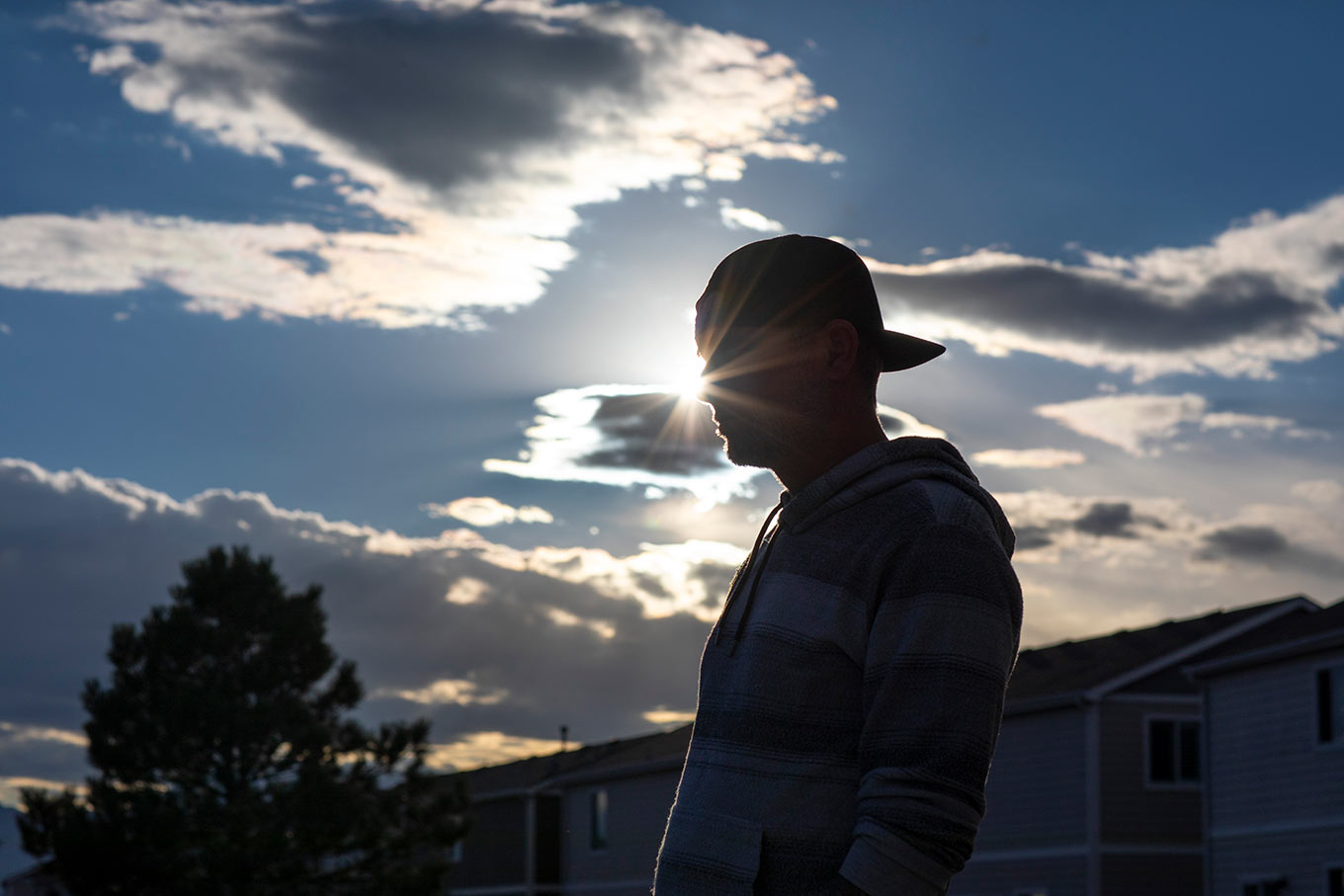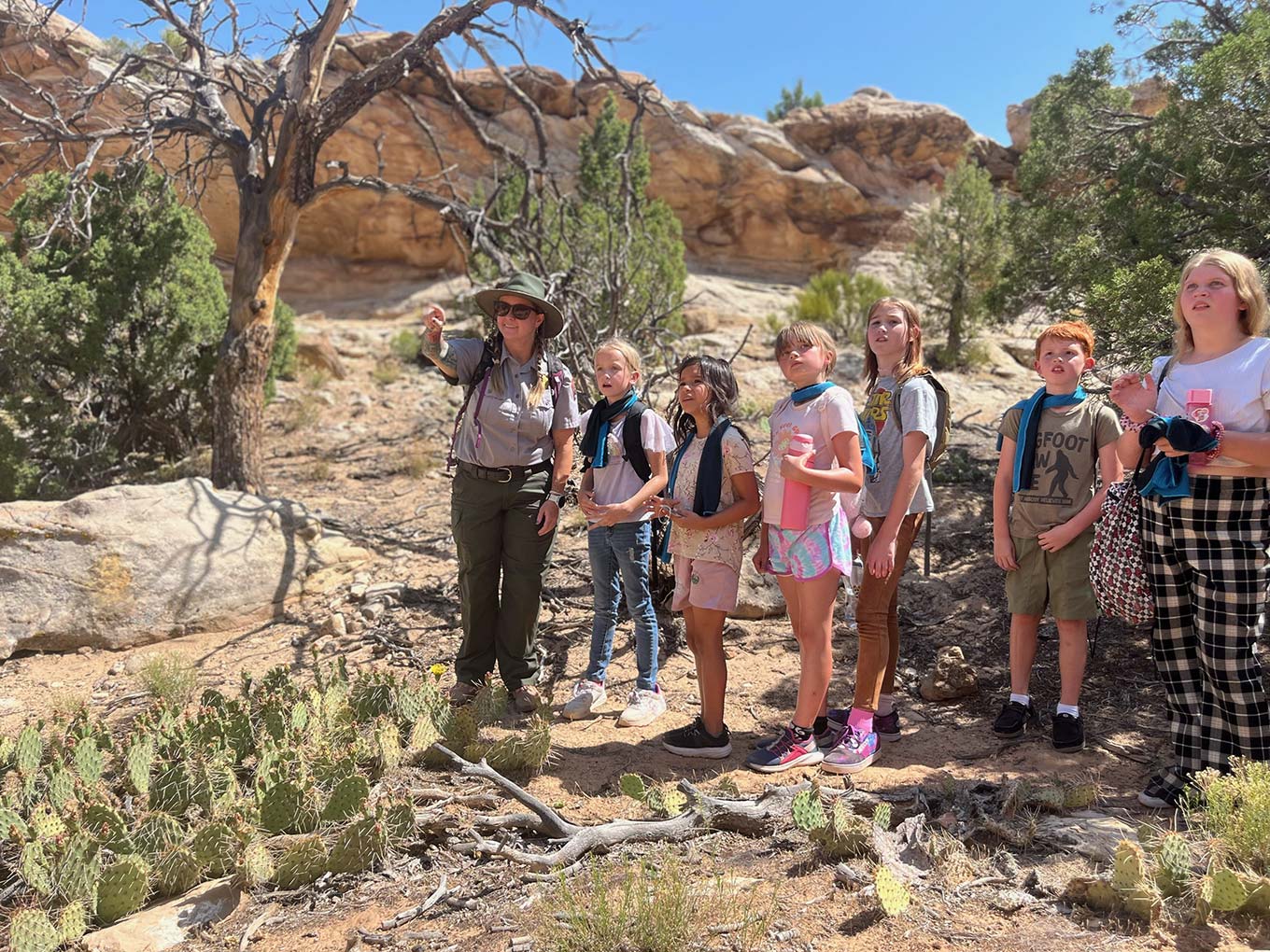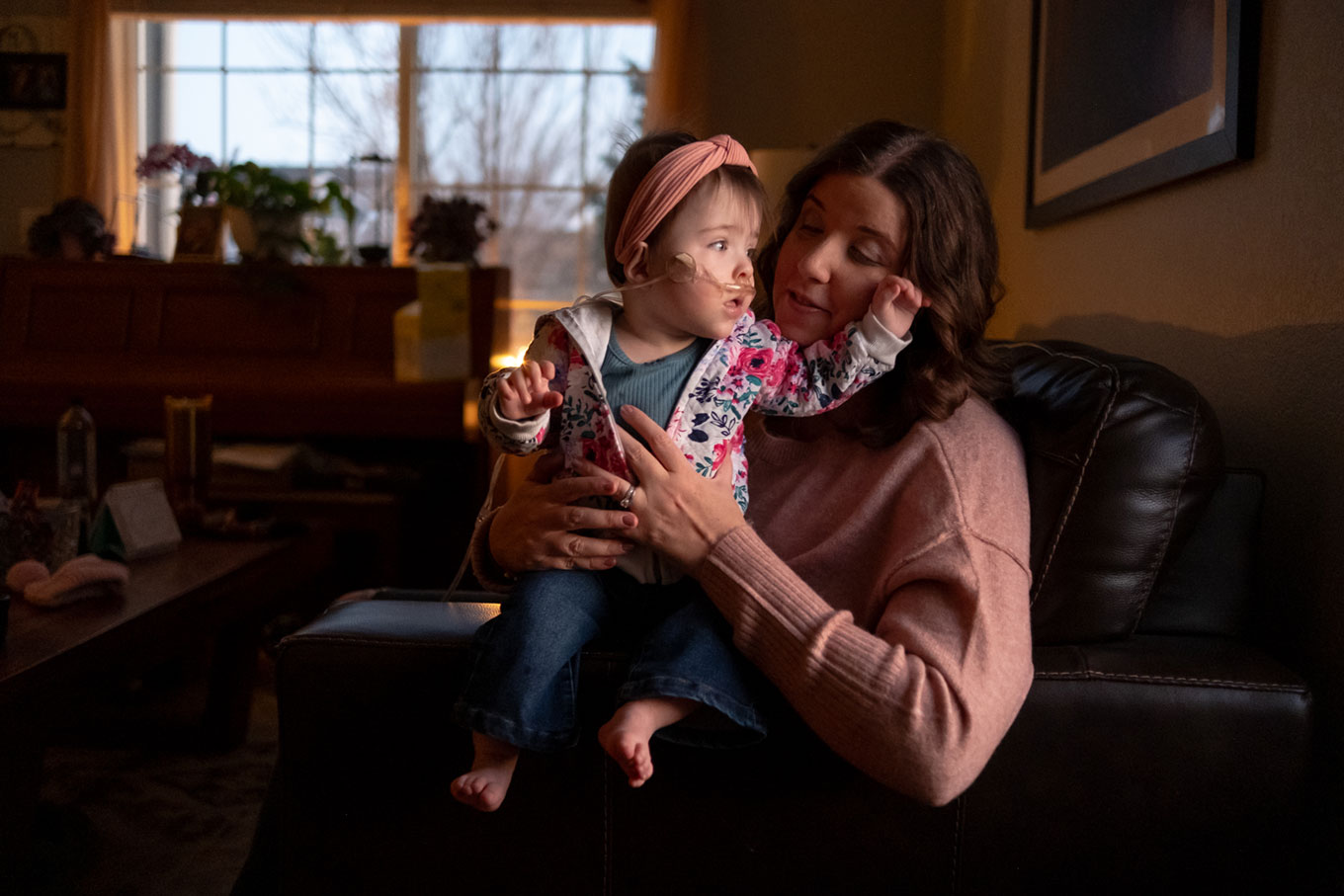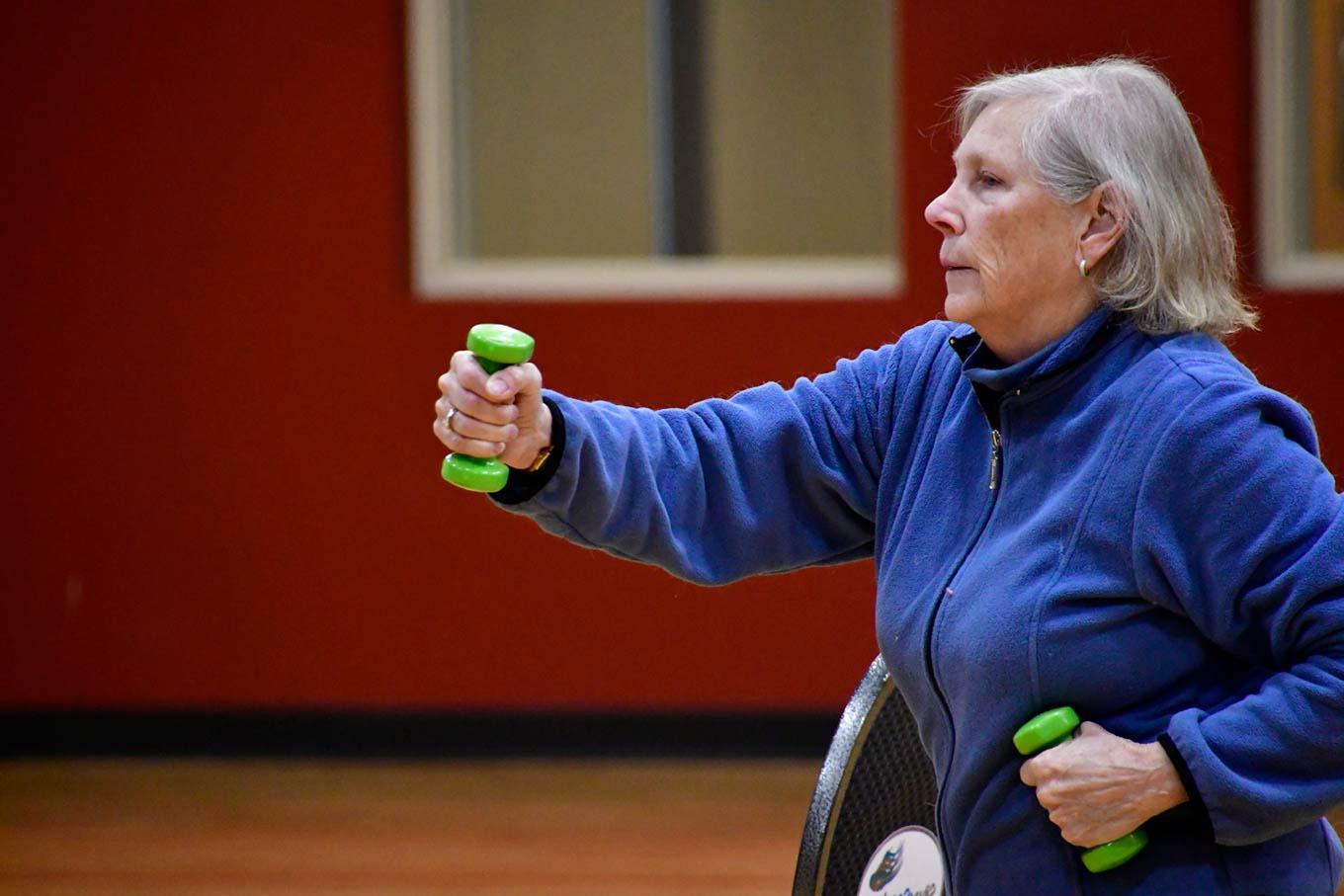Sitting outside on a warm July day in a white polo, his black ballcap backward, Heath Miller recounts his military career.
Originally from Tampa, Fla., Miller spent 12 years in the Marine Corps, including multiple deployments to Kosovo and Afghanistan as a heavy machine-gunner. After an injury and the loss of multiple friends to suicide, Miller decided he was ready for the next step in his life. He was discharged in 2008 and moved to Colorado.
Adjusting to civilian life was at first relatively uncomplicated for Miller. He found work testing snowboards and at UPS. He got married, had two kids, and settled in Colorado Springs.
His wife, however, had long struggled with addiction. As he recalls it, after she secretly spent $30,000 of their savings on drugs, Miller, now 47, helped get her into rehab. She cheated on him during that time, and he was devastated. He sought a way to numb his feelings and found opiates—drugs he was familiar with from a soccer injury in college.
The former athlete, who grew up Southern Baptist with parents who don’t drink alcohol, became addicted. Narcan (a nasal spray that can reverse an opioid overdose) brought him back from the brink of death twice during his four-year spiral. He stole money from his employer and was eventually arrested. After being released through El Paso County’s Veterans Trauma Court, which provides alternatives to incarceration to veterans and active-duty military who are dealing with trauma or substance use issues, he started using again and soon found himself back behind bars.
Back in the veterans’ court, he was connected with Next Chapter. The collaborative program links veterans and their family members with mental and behavioral health care and other necessary resources at little to no cost. (Care is paid through the client’s insurance or underwritten by UCHealth.) It’s a one-stop shop for many veterans living in the region.
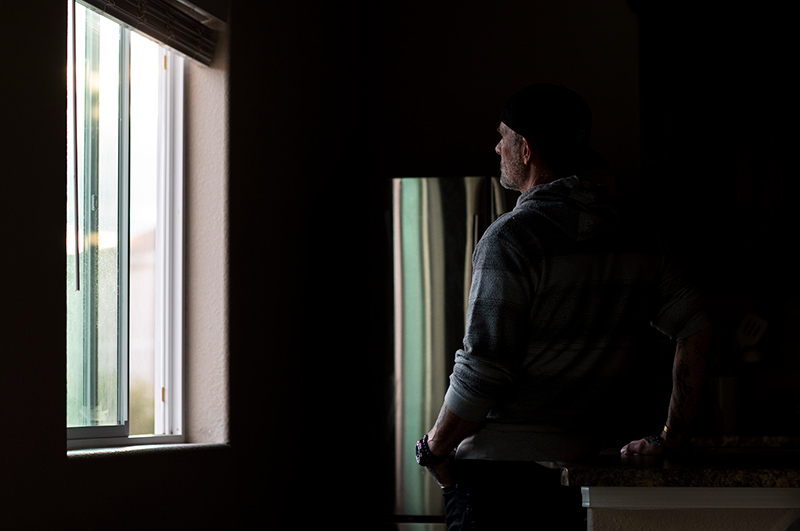
Heath Miller inside his home in Colorado Springs, Colo. on Thursday, Oct. 9, 2025. Miller, a Marine Corps veteran, utilized the Next Chapter program for mental and behavioral health services. Photo by Parker Seibold / Special to The Colorado Trust
Colorado is home to more than 369,000 veterans, according to the U.S. Department of Veterans Affairs (VA). In 2022 (the most recent data available), 178 of them took their lives—a rate that is significantly higher than the national veteran suicide rate and the overall rate for the state and the country. In 2023, Colorado Department of Public Health & Environment data shows that veterans accounted for 21% of the state’s suicides by firearm, the most common method.
To combat those devastating statistics, Colorado in 2021 established a pilot program to reduce the veteran suicide rate. Next Chapter is the result of that legislation.
Three days after his intake interview with the Next Chapter team, Miller had a bed at UCHealth’s Center for Dependency, Addiction and Rehabilitation in Aurora. He stayed for two months. Miller was then released to a sober living community in the Springs and was required to report to the veterans’ court every week for two years.
His Next Chapter mentors were there every time—literally. In each instance that Miller had a court appearance, one or more mentors kept him company, Miller says. They even helped him find an apartment once he was in a position to live independently.
“Sometimes that’s the biggest challenge—for a veteran who’s struggling, anybody who’s struggling—is to know who to call,” says Bruce Cowan, director of the Colorado Division of Veterans Affairs. “We sent these young men and women away to do a job, and if they come back broken, in need of help, we as a society owe them that debt.”
With no family around—Miller’s sons had been sent by the courts to live with his brother in Texas—the Next Chapter team became Miller’s sole support system.
“I definitely didn’t open up to the idea of therapy and someone and asking for help—that’s just not what’s bred into us in the military, in the Marine Corps especially,” Miller said, squinting beneath a bluebird sky. “Honestly… if those [Next Chapter] people wouldn’t have been there, I don’t know how successful I would have been.”
A testing ground for veteran mental health
El Paso County is a vast rectangular swath in the state’s center, encompassing Colorado Springs and numerous military installations. The county’s 2,130 square miles holds the largest veteran population in Colorado, accounting for one-quarter of the state’s total military population.
As of 2020, it also claimed one of the highest veteran suicide rates in the country: one veteran was dying by suicide per week in the El Paso area. Legislators viewed it as an ideal testing ground for a suicide prevention initiative.
“Veterans are dealing with many multifaceted challenges… . Part of the challenge is connecting veterans with the programs that exist—making sure they know how to maximize and use those programs,” said Leroy Garcia, a Marine Corps veteran who was Colorado State Senate president while the effort was moving through the legislature. “All of these processes need to be made a little bit easier to meet the veteran where they’re at.”
The Veterans Administration provides mental health care and resources at eight clinics across Colorado, but the nationwide system has long been plagued by excessive wait times and bureaucracy. In mid-September, the wait time for a new patient seeking mental health services at the VA’s three Colorado Springs-area clinics was a minimum of 32 days. (Veterans are assigned to one of eight priority groups, which can impact the speed with which they can connect with care.)
Going through Next Chapter, the same people can obtain an appointment with a mental health provider within nine days.
“There are some very specific challenges with military veterans that we just don’t always see in the civilian community,” said Damian McCabe, UCHealth director of military affairs and director of behavioral health for the system’s southern Colorado region. “We’re asking people to navigate complex systems at the worst time in their life, at the highest point of crisis.”
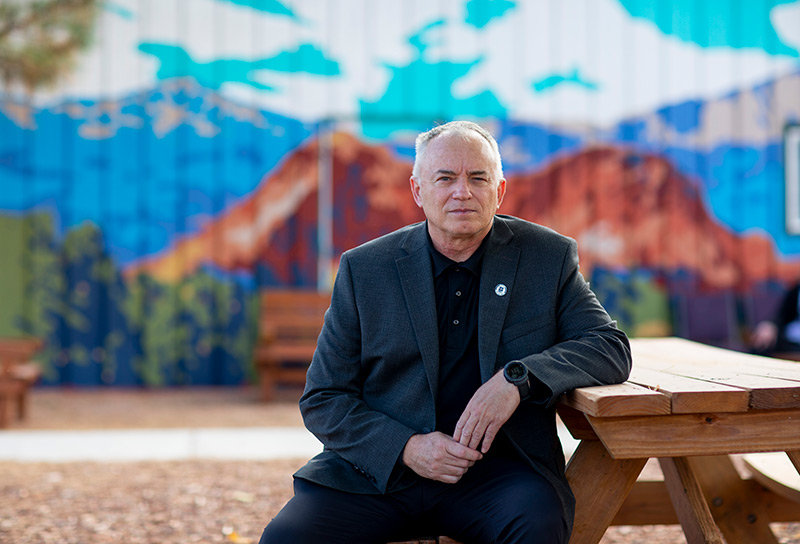
Damian McCabe, the UCHealth director of military affairs and director of behavioral health for southern Colorado, sits outside Next Chapter’s office on Thursday, Oct. 9, 2025, in Colorado Springs, Colo. Photo by Parker Seibold / Special to The Colorado Trust
Rather than send a veteran to find a provider or sit on hold on the phone—increasing the chances they’ll grow frustrated or never connect for care—Next Chapter does warm handoffs and has providers contact the veterans and schedule appointments based on their availability.
Next Chapter serves as a single point of contact that a veteran or family member can reach out to (in person or virtually) to connect with a host of aid above and beyond mental health services, from emergency food assistance and job skills development to education and family support programs. Next Chapter has partnerships with providers like the Mt. Carmel Veterans Service Center and NAMI Colorado Springs.
Next Chapter is also staffed entirely by veterans, which helps clients feel seen and understood. All associated providers receive military cultural competency training via UCHealth.
Leah Jackson, a behavioral health clinical therapist with Next Chapter and an Army veteran, has had other veterans tell her that they felt like “a piece of trash” after meeting with an unfamiliar therapist. Her own experiences, she says, made her feel like she wasn’t being heard.
“This [Next Chapter] model has really taken those barriers down,” she said.
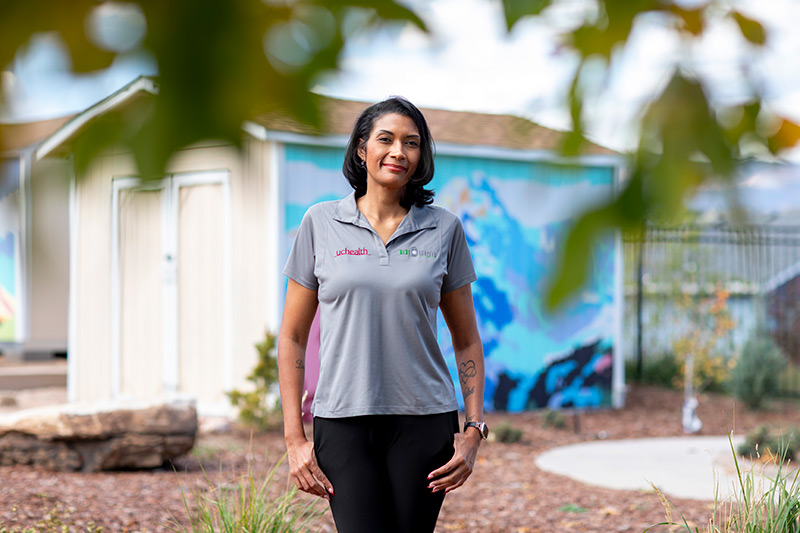
Leah Jackson, a UCHealth behavioral health clinical therapist with Next Chapter and an Army veteran, stands outside Next Chapter’s office on Thursday, Oct. 9, 2025, in Colorado Springs, Colo. Photo by Parker Seibold / Special to The Colorado Trust
The initiative set out to connect with 700 veterans. It’s served 1,232 thus far, with 86% seeking behavioral health support. A June 2025 report on the program’s efficacy by the Evaluation Center at the University of Colorado Denver found that more than 80% of participants reported a drop in their thoughts of self-harm and suicide. Of those who reported prior suicide attempts, the majority had decreased those attempts, and 77% of respondents “reported having never successfully received care before Next Chapter.”
McCabe had initially hoped simply to keep the suicide attempt rate from increasing. Yet, unexpectedly, there was a 5% drop in the number of veterans’ lives lost to suicide in the program’s first year. And although El Paso County saw an increase in the veteran suicide rate between 2022 and 2023 (newer data won’t be available until later this year), there have been no known suicide deaths among Next Chapter clients since it came online in June 2022.
“The success of the pilot program is incredibly encouraging, showing that those kinds of population-specific programs are effective, and more broadly, that wraparound service models work,” said Allie Eliot, chief communications officer for the Colorado Behavioral Health Administration (BHA). “Veterans and their families have very unique behavioral health needs, and so this program and others like it are really critical to fostering and uplifting programs that are tailored to those unique needs.”
More help for veterans on the way
In May, the state legislature expanded the pilot program, with funding from a new state tax on firearms sellers approved by voters in November 2024. According to the BHA, nonprofits can apply for the extended grant program once funding becomes available. (Proposition KK was primarily designed to support crime victims, with $30 million of incoming sales tax supporting victim services. After reaching that number, up to $5 million will be put toward veterans’ mental health services.)
That money is about three times as much as what the original pilot program operated on, so it could put a significant dent in the lengthy wait times some veterans are experiencing by giving them additional options for care beyond the VA.

The Mt. Carmel Veterans Service Center in Colorado Springs, on Oct. 17, 2025. The Next Chapter program provides services here to veterans and their family members that include mental health support, food assistance, job skills development and more. Photo by Parker Seibold / Special to The Colorado Trust
While the wait for the funding continues, Next Chapter continues to operate, though it can’t currently cover care costs as its initial pilot budget has been emptied. That’s part of why the effort included training other service providers and nonprofits—to begin increasing the number of veteran-competent care providers across the state.
The broadening of the Next Chapter model has always been the goal.
“We recognized then that if we could point to a county and say, ‘This has been successful, we’ve helped move the dial,’ we could build from there,” Garcia, the former Senate president, said. “The veterans have the drive and the grit. We just have to pull it back out of them.”
Garcia sees that growth as particularly critical right now, when war and active duty are far from U.S. soil.
“It means you still have vets out there dealing with substance abuse, dealing with homelessness,” he said. “They’re still out there—they might just be a little more in the shadows.”
Miller has stepped out from those shadows and regained solid footing with help from Next Chapter and others. He has been sober for nearly four years, received his certification as a peer recovery coach and works as the housing director for Purple Mountain Recovery, a nonprofit in Colorado Springs that supports LGBTQIA+ individuals as they recover from mental health and addiction-related issues.
He was also recently granted full custody of his kids.
Next Chapter “was a very integral part of getting me where I’m at today,” he said. “I remember all the help I got, and I remember how hopeless everything felt.”
The biggest takeaway for him? “There’s no shame in asking for help.”
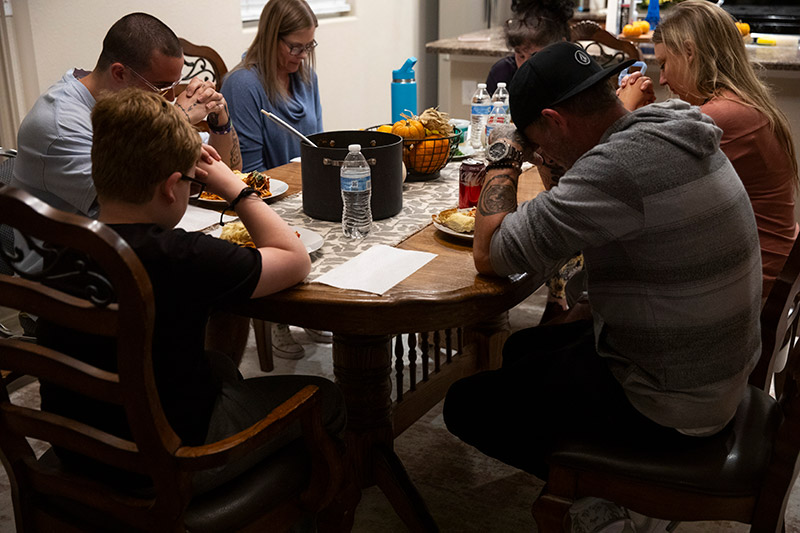
Heath Miller (front right) and his son Brecken (front left) are joined by friends and family as they say grace before dinner on Thursday, Oct. 9, 2025, in Colorado Springs, Colo. Photo by Parker Seibold / Special to The Colorado Trust
